|
De Amerikaanse dichteres en schrijfster Lucille Clifton werd geboren in New York op 27 juni 1936. Zie ook alle tags voor Lucille Clifton op dit blog.
Shapeshifter Poems
1
the legend is whispered
in the women's tent
how the moon when she rises
full
follows some men into themselves
and changes them there
the season is short
but dreadful shapeshifters
they wear strange hands
they walk through the houses
at night their daughters
do not know them
2
who is there to protect her
from the hands of the father
not the windows which see and
say nothing not the moon
that awful eye not the woman
she will become with her
scarred tongue who who who the owl
laments into the evening who
will protect her this prettylittlegirl

Lucille Clifton (27 juni 1936 – 13 februari 2010)
De Spaanse schrijver Rafael Chirbes werd geboren op 27 juni 1949 in Tabernes de Valldigna bij Valencia. Zie ook alle tags voor Rafael Chirbes op dit blog
Uit: Aan de oever (Vertaald door Eugenie Schoolderman en Arie van der Wal)
“Dat soort dingen had hij vast van mijn grootvader geleerd, die ze las in de romans van Russische schrijvers die hij leende uit de volksbibliotheek in Misent (in Olba was toen nog geen bibliotheek), waar hij op zijn fiets naartoe ging. Hij trok zijn beste kleren aan voor de tocht, de onderpijpen zorgvuldig bijeengebonden in de metalen broekklemmen, net als ik jaren later mijn vader zag doen op vrijdagmiddag, al was de volksbibliotheek tegen die tijd al verdwenen en stonden er waarschijnlijk niet veel Russische boeken meer in de gemeentelijke bibliotheek. De mannen uit mijn familie hielden van die romans. Ze kwamen bij ons in huis tot het einde van de oorlog (dat ook het einde van het leven van mijn grootvader was), evangeliën met een gedragscode die moest gaan gelden, over de gewelddadige opstand van de massa’s, kronieken van de heldendaden van de arbeiders. ‘Russisch’ betekende de Sovjet-Unie, moeder aller arbeiders in de wereld. Francisco en ik hebben het er meer dan eens over gehad hoe sterk een aantal generaties Spanjaarden is verlicht door alles wat Russisch was (hoewel dat Sovjet-Russische licht voor de ooms en tantes, grootouders en vader en moeder van Francisco eerder tegenlicht was: een verblindende dreiging). Als je nu ‘Russisch’ zegt, denk je aan het allerergste: afpersing, maffia, vrouwenhandel, handel in mensenvlees in het algemeen, dat net als bij kuddes dieren van een afstand gezien allemaal hetzelfde lijkt, maar schittert door het eigen karakter dat je voor je hebt, wondermooie lijven staan in de clubs langs de grote weg voor slechts veertig of vijftig euro tot je beschikking. Het Sovjetgebeuren. De klassenstrijd. Mijn vader heeft altijd geweigerd zijn timmerbedrijf uit te breiden. We nemen de opdrachten aan die we kunnen doen. Meer niet. We leven niet van het werk van anderen, maar van dat van onszelf.”
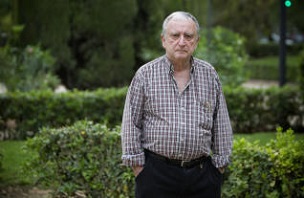
Rafael Chirbes (Tabernes de Valldigna, 27 juni 1949)
De Nigeriaans-Amerikaanse schrijver, fotograaf en kunsthistoricus Teju Cole werd geboren op 27 juni 1975 in Kalamazoo, Michigan. Zie ook alle tags voor Teju Cole op dit blog.
Uit: Open City
“I liked the murmur of the announcers, the sounds of those voices speaking calmly from thousands of miles away. I turned the computer's speakers low and looked outside, nestled in the comfort provided by those voices, and it wasn't at all difficult to draw the comparison between myself, in my sparse apartment, and the radio host in his or her booth, during what must have been the middle of the night somewhere in Europe. Those disembodied voices remain connected in my mind, even now, with the apparition of migrating geese. Not that I actually saw the migrations more than three or four times in all: most days all I saw was the colors of the sky at dusk, its powder blues, dirty blush and russetts, all of which gradually gave way to deep shadow. When it became dark, I would pick up a book and read by the light of an old desk lamp. I had rescued the lamp from one of the dumpsters at the university; its bulb was hooded by a glass bell that cast a greenish light over my hands and the book on my lap, as well as on the worn upholstery of the sofa. Sometimes, I even spoke the words in the book out loud to myself, and doing so I noticed the odd way my voice mingled with the murmur of the French, German or Dutch radio announcers, or with the thin texture of the violin strings of the orchestras, all of this intensified by the fact that whatever it was I was reading had likely been translated out of one of the European languages. That fall, I flitted from book to book: Barthes's Camera Lucida, Peter Altenberg's Telegrams of the Soul, Tahar ben Jelloun's The Last Friend, among others.
In that sonic fugue, I recalled Saint Augustine, and his astonishment at Saint Ambrose who was reputed to have found a way to read without sounding out the words. It does seem an odd thing—it strikes me now as it did then—that we can comprehend words without voicing them. For Augustine, the weight and inner life of sentences were best experienced out loud, but much has changed in our idea of reading since then. We have for too long been taught that the sight of a man speaking to himself is a sign of eccentricity or madness; we are no longer at all habituated to our own voices, except in conversation or from within the safety of a shouting crowd. But a book suggests conversation: one person is speaking to another, and audible sound is, or should be, natural to that exchange. So, I read aloud with myself as my audience, and gave voice to another's words.”
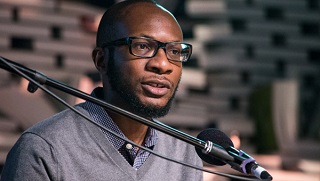
Teju Cole (Kalamazoo, 27 juni 1975)
De Amerikaanse dichter, schrijver en kunstcriticus Francis Russell "Frank" O'Hara werd geboren op 27 juni 1926 in Baltimore. Zie ook alle tags voor Frank O'Hara op dit blog.
Yesterday Down at the Canal
You say that everything is very simple and interesting
it makes me feel very wistful, like reading a great Russian novel does
i am terribly bored
sometimes it is like seeing a bad movie
other days, more often, it's like having an acute disease of the kidney
god knows it has nothing to do with the heart
nothing to do with people more interesting than myself
yak yak
that's an amusing thought
how can anyone be more amusing than oneself
how can anyone fail to be
can i borrow your forty-five
i only need one bullet preferably silver
if you can't be interesting at least you can be a legend
(but i hate all that crap)
Animals
Have you forgotten what we were like then
when we were still first rate
and the day came fat with an apple in its mouth
it's no use worrying about Time
but we did have a few tricks up our sleeves
and turned some sharp corners
the whole pasture looked like our meal
we didn't need speedometers
we could manage cocktails out of ice and water
I wouldn't want to be faster
or greener than now if you were with me O you
were the best of all my days
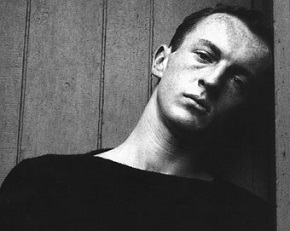
Frank O'Hara (27 juni 1926 - 25 juli 1966)
De Amerikaanse dichter en schrijver Paul Laurence Dunbar werd geboren op 27 juni 1872 in Dayton, Ohio. Zie ook alle tags voor Paul Laurence Dunbar op dit blog.
We Wear The Mask
We wear the mask that grins and lies,
It hides our cheeks and shades our eyes,--
This debt we pay to human guile;
With torn and bleeding hearts we smile,
And mouth with myriad subtleties.
Why should the world be overwise,
In counting all our tears and sighs?
Nay, let them only see us, while
We wear the mask.
We smile, but, O great Christ, our cries
To thee from tortured souls arise.
We sing, but oh the clay is vile
Beneath our feet, and long the mile;
But let the world dream otherwise,
We wear the mask!
A Golden Day
I Found you and I lost you,
All on a gleaming day.
The day was filled with sunshine,
And the land was full of May.
A golden bird was singing
Its melody divine,
I found you and I loved you,
And all the world was mine.
I found you and I lost you,
All on a golden day,
But when I dream of you, dear,
It is always brimming May.
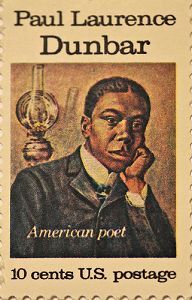
Paul Laurence Dunbar (27 juni 1872 - 9 februari 1906)
De Nederlandse schrijver Everhardus Johannes Potgieter werd geboren in Zwolle op 27 juni 1808. Zie ook alle tags voor Potgieter op dit blog.
Uit:Jan, Jannetje en hun jongste kind
“Jannetje ziet wel eens zuur, het is waar, als zij al den vreemden opschik gâslaat, die harer dochteren om ‘de teêre leedjens bengelt;’ Jannetje ziet nog zuurder als zij de piano hoort rammelen en haar oor uitheemsche klanken vangt, in plaats van de liedekens, welke zij plagt te kwelen: Jannetje ziet allerzuurst, als zij in het huis van een harer kinderen vreemde drempelmeiden ontmoet, Brabandsche bonnes, Zwitsersche gouvernantes, Fransche floddermadammen, doch dat gebeurt maar enkel, doorgaans is zij over hare dochters nog al tevreden: hoe kan het anders? Orde, spaarzaamheid, liefhebberij in het kraak-zindelijke, huiselijkheid, deernis met armoede, vroomheid, zij heeft ze haar van kindsbeen af ingescherpt! Hoe zij verjongt als ze hare eigene liefelijkheid herboren ziet in den schroom van eene aanvallige bruid! - bruidstranen zijn een eigenaardig zwak van Jannetje - in het geluk eener jeugdige echtelinge! - het te huis is de hemel eener hollandsche vrouw, - in de dankbaarheid eener zalige moeder! - Jannetje plagt in hare jeugd bij de wieg in den Bijbel te lezen. - Hoe zij verjongt, als eene wolk van gezondheid om hare knieën dartelt; eene wolk, waaruit zij allerlei zoete stemmetjes: ‘grootemoê! grootemoê!’ hoort roepen.
‘Vader!’ vraagt ze nu - gevalt u de trouwhartige uitdrukking niet? Jan heeft intusschen zijn glas geledigd, wèl bekome het hem! - ‘Vader!’ vraagt zij, ‘hebben we een goed jaar gehad?’
Zij heeft er alle regt toe, zij, die hem het huis hielp bouwen!
‘Als ik mijne koetjes niet vroeger op het drooge had gebragt,’ antwoordt hij, met een spreekwoord van zijne voorvaders, die kaasboeren waren, ‘het zou me zwaar zijn gevallen, ze in Een en Veertig uit het water te halen!’
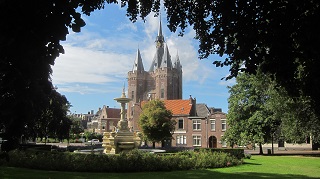
Potgieter (27 juni 1808 – 3 februari 1875)
Zwolle, de Sassenpoort
De Nederlandse dichter Kees Ouwens werd geboren op 27 juni 1944 in Zeist. Zie ook alle tags voor Kees Ouwens op dit blog.
In het donker
Fluitekruid, ik kom tot u, want gij zijt wit
en voor hetzelfde geld ook rein.
Als ik neerdaal in het gras, omdat mijn
kruis weer strak gespannen staat,
vindt gij dat niet afkeurenswaardig.
Want gij zijt een echte moeder en al wat goed is voor
uw kind bevordert gij uit alle macht.
O, geurige bloem, ik ruik u niet, maar
gij zijt er toch, al heerst alom nacht.
Achter mij sluit ik de deur en ga
over de schreiende aarde op zoek naar u.
Omdat het een hete zomer is, draag ik slechts een wit overhemd.
Over mijn wangen ligt een bezeten blos,
maar ik vind u niet.
O, duistere nacht.
O, wedervaren, met hier en daar een bui.
Even afgestapt
In de berm van het geluk staat een fiets achter mij.
Uitgestrekt grasland tot aan de zoom van mijn schoen.
Een paardje dat voorbijkleppert is smaakvol
uitgerust met een paardedeken.
Van verre klinkt het gezang van een officiële
begrafenis.
In een rug van hoge luchtdruk doet
ook de zon zijn best.
Ontspannen tussen hondsdraf voel ik dat
ik bloed heb.
O, gij bloedvat, kreunt de mol in zijn onderaardse
grotten.
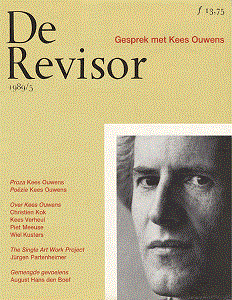
Kees Ouwens (27 juni 1944 – 24 augustus 2004)
Cover De Revisor, mei 1989
De Canadese dichter, singer-songwriter, performer en sociale activist. Dawud (David) Wharnsby Ali werd geboren op 27 juni 1972 in Kitchener, Ontario. Zie ook alle tags voor Dawud Wharnsby op dit blog.
Wings Against my Window
Wings against my window
are they birds or are they angels,
waking me for worship
at fajr, before dawn?
Wings against my window
are they birds or are they angels,
singing me from slumber?
soon night will be gone.
I hear sparrows whistle
making the adhan.
I hear their words telling me I am a lazy man
“Come fast to pray”, they say,
“You will find success that way.
Stand up now from where you lay.
This is the best time of the day”
Wings against my window
Are they birds or are they angels,
waking me for worship
at fajr, before dawn?
Wings against my window
are they birds or are they angels,
singing me from slumber?
soon night will be gone.
My heart, it wants to wake up
my body wants to sleep.
The morning air is brisk and cool
my bed is warm and deep.
Birds, they call me to the way,
“Stand before Allah to pray!
Kiss the dawn and greet the day!”
But dreams, they just get in the way.
Wings against my window
are they birds or are they angels,
waking me for worship
at fajr, before dawn?
Wings against my window
are they birds or are they angels,
singing me from slumber?
soon night will be gone.

Dawud Wharnsby (Kitchener, 27 juni 1972)
De Braziliaanse schrijver João Guimarães Rosa werd geboren op 27 juni 1908 in Cordisburgo, Minas Gerais. Zie ook alle tags voor João Guimarães Rosa op dit blog.
Uit: The Devil To Pay In The Backlands (Vertaald door James L. Taylor en Harriet de Onís)
« Everybody believes what he says: that there are certain places, three of them, that he can’t go near without hearing a faint crying behind him, and a little voice saying: “I’m coming! I’m coming!” It’s the Whoosis, the What-You-May-Call-Him. And then take Jisé Simplício. Anybody here will swear to you that he keeps a captive demon in his house – a little imp who is obliged to help him in his shady dealings, which is why Simplício is on his way to getting rich. They say this is also the reason Simplício’s horse shivers and shies when Simplício tries to mount. Superstition. Jisé Simplício and Aristides are prospering, imp or no imp. Now listen to this: there are people who insist that the devil himself stopped off at Andrequicé while passing through there recently. It seems that a certain young man, a stranger, showed up and boasted that he could get from there here in only twenty minutes – it takes a full day and a half on horseback – because he would go around the headwaters of the Rio do Chico. * Perhaps, who knows – no offense intended – it could have been you yourself when you passed through there, just joking for the fun of it? Don’t hold it against me – I know you didn’t. I meant no harm. It is just that sometimes a question at the right time clears the air. But, you understand, sir, if there was such a young man, he just wanted to pull somebody’s leg. Because, to circle the headwaters he would have to go deep into this state of ours and then double back, a trip of some three months. Well, then? The whoosis? Nonsense. Imagination. And then this business of politely calling the devil by other names – that’s practically inviting him to appear in person, in the flesh! Me, I have just about lost all my belief in him, thanks to Gog; and that’s the honest truth I’m telling you, though I know he is taken for a fact and the Holy Gospels are full of him. Once I was talking with a young seminarian, very amiable he was, turning the pages and reading en his prayer book. He had on his vestments and bore a wand of chaste-tree in his hand. He said he was going to help the priest drive the Whoosis out of an old woman os Cachoeira-dos-Bois. I don’t believe a word of it. My compadre Quelemém claims that it’s the lower spirits that cause these manifestations, the third-class ones, milling about in the pitch darkness, seeking contact with the living, and that sometimes they will give a man real support. My compadre Quelemém is the one who eases my mind – Quelemém de Góis is his full name. But he lives so far from here – at Jijujã, on the Vereda do Burití Pardo.”
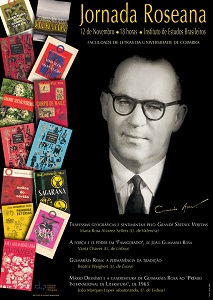
João Guimarães Rosa (27 juni 1908 – 19 november 1967)
Cover
Zie voor nog meer schrijvers van de 27e juni ook mijn blog van 27 juni 2016 en eveneens mijn blog van 27 juni 2015 deel 2.
|



